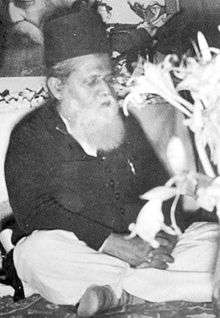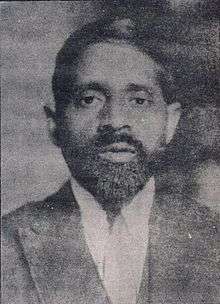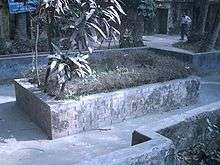Muhammad Shahidullah
| Muhammad Shahidullah | |
|---|---|
 Shahidullah in a literary conference in Curzon Hall, Dhaka (April 1954) | |
| Native name | মুহম্মদ শহীদুল্লাহ |
| Born |
10 July 1885 Peyara village, 24 Parganas, Bengal Presidency, British India |
| Died |
13 July 1969 (aged 84) Dacca, now Dhaka, East Pakistan, now Bangladesh |
| Education | Ph.D. |
| Alma mater | |
| Occupation | educationist, writer, philologist and linguist |
| Spouse(s) | Marguba Khatun |
| Children | Muhammad Takiullah, Murtaja Baseer |
| Awards |
Chevalier De L'Ordre des Arts et des Lettres (1967) Independence Day Award (1980) |
Muhammad Shahidullah (10 July 1885 – 13 July 1969)[1] was a Bengali educationist, writer, philologist and linguist.[2][3]
In 2004, Shahidullah was ranked number 16 in BBC's poll of the Greatest Bengali of all time.[4][5][6]
Biography

Shahidullah was born in Peyara village, 24 Pargana, West Bengal (now in India) to a devoutly religious family. His father, Mafizuddin Ahmed, was a warden of a shrine. Shahidullah passed his school final Entrance exam in 1904 from Howrah Zilla School. In 1906 he passed the FA exam from Presidency College in Kolkata. He received the Bachelor of Arts degree with Honors in Sanskrit in 1910 from City College, Kolkata, and Master of Arts in 1912 in comparative philology from the University of Calcutta. He earned his PhD degree from Sorbonne University in 1928 for his research on the dialects of the Charyapada.[1] He was the first Indian Muslim to receive this doctorate degree.
Shahidullah began teaching in Jessore Zila School in 1908. After working as the headmaster of Sitakunda High School for some time in 1914, he practiced law at Bashirhat in 24 Parganas. In 1915 he was elected Vice-Chairman of the town's municipality. He was Sharatchandra Lahiri Research Fellow (1919–21) under Dinesh Chandra Sen at the University of Calcutta and joined the University of Dhaka as a lecturer in 1921 in Sanskrit and Bangla. During his period at the University of Dhaka he did research on the origins of the Bengali language. In 1925, he presented his thesis that Bangla as a language originated from Gaudi or Magadhi Prakrit. He was principal of Bogra Azizul Huq College from 1944–1948. He then returned to the University of Dhaka, serving as head of the Bangla Department and dean of the Faculty of Arts. He taught part-time at the Law Department (1922–25) and the International Relations Department as a teacher of French (1953–55). He worked as head of the Bangla and Sanskrit Department of the University of Rajshahi (1955–58).[7]
Noteworthy books
- Sindabad Saodagarer Galpa (The Stories of the Merchant Sindbad, 1922)
- Bhasa O Sahitya (Language and Literature, essays, 1931)
- Bangala Byakaran (Bangla Grammar, 1936)
- Diwan-i-Hafiz (Poems of Hafiz, translation, 1938)
- Shikwah O Jawab-i-Shikwah (Questions and Their Answers, translation from Iqbal, 1942)
- Rubaiyat-i-Omar Khaiyam (Quatrains of Omar Khayyam, translation, 1942)
- Essays on Islam (1945)
- Amader Samasya (Our Problems, essays, 1949)
- Padmavati (Volume I ed, 1950)
- Bangla Sahityer Katha (History of Bangla Literature, Volume I in 1953, Volume II in 1965)
- Vidyapati Shatak (Collection of Vidyapati's Songs, text analysis, 1954)
- Bangla Adab Ki Tarikh (History of Bangla Literature, essays, in Urdu, 1957)
- Bangla Sahityer Itihas (History of Bangla Literature, 1957)
- Bangala Bhasar Itibrtta (History of Bangla Language, 1959)
- Qur'an Sharif (The Qur'an, 1963)
- Amarkabya (Unforgettable Poetical Works, 1963)
- Sekaler Rupkatha (Fairy Tales of Ancient Time, 1965[8]
Family
Shahidullah has seven sons and two daughters. His third son A.K.M. Zakiyullah established a school named 'Dr. Shahidullah Gyanpith' in Hazi Osman Goni Road, Alu bazaar (Old Dhaka) and a research library named ’Dr. Shahidullah Memorial Library and Language Research Center’ in Senpara Parbata, Mirpur-10, Dhaka. Another of his son Dr. Abul Bayan M. Naqiyyullah (M.S) studied in George Washington University in Washington DC, USA and settled in Cairo, Egypt after serving as a pathologist in Saudi Arabia. He married an Egyptian women and has two sons and three daughters.
Another of Dr. Shahidullah's son, A.K.M. Bashirullah – known popularly by his alias Murtaja Baseer – is considered as one of the most stylish and foremost painters in Bangladesh. [9]
Awards

Shahidullah made Professor Emeritus by the University of Dhaka (1967) for his lifetime contribution in research on language and literature. He was also awarded Chevalier De L'Ordre des Arts et des Lettres by the French government in 1967 for his research on language and literature.[1] In 1980 the Government of Bangladesh Awarded him Independence Award posthumously.
References
- 1 2 3 Badiuzzaman (2012). "Shahidullah, Muhammad". In Sirajul Islam and Ahmed A. Jamal. Banglapedia: National Encyclopedia of Bangladesh (Second ed.). Asiatic Society of Bangladesh.
- ↑ University of Rajshahi
- ↑ "Remembering a luminary: Bangla Academy celebrates Shahidullah's birth anniversary". The Daily Star. July 2014.
- ↑ "Listeners name 'greatest Bengali'". 2004-04-14. Retrieved 2018-01-11.
- ↑ "BBC Listeners' Poll – Bangabandhu judged greatest Bangali of all time". The Daily Star (Vol. 4 Num 313 ed.). Retrieved 2018-01-11.
- ↑ "The Hindu : International : Mujib, Tagore, Bose among `greatest Bengalis of all time'". www.thehindu.com. Retrieved 2018-01-11.
- ↑ "Dr. Muhammad Shahidullah: Exploring the roots of Language". The Daily Star. 11 July 2011. Retrieved 22 February 2018.
- ↑ "Dr. Muhammad Shahidullah - advancement of Bangla language, awards, passing & burial - biography of Muslim and Bengali". Londoni.
- ↑ "Dr. Muhammad Shahidullah - early life of Gyantaposh, education, family life, career - biography of Muslim and Bengali". Londoni.
External links
| Wikimedia Commons has media related to Muhammad Shahidullah. |
- Khondkar Serajul Huq (2012), "Muslim Sahitya-Samaj", in Sirajul Islam and Ahmed A. Jamal, Banglapedia: National Encyclopedia of Bangladesh (Second ed.), Asiatic Society of Bangladesh